#wadham college
Explore tagged Tumblr posts
Text
A new discovery of methane leaks in Antarctica could be a game-changer and potential near-term threat that’s difficult to characterize without sounding overly negative. Of course, situations like this that appear threatening to civilization, or life as we know it, are difficult to believe and accept as something the will really happen, which is understandable because nothing in human history compares to the risk attendant to the dreaded runaway greenhouse effect. So, there’s nothing in human history to compare it to.
Nevertheless, there are scientists who believe we are living on borrowed time because of massive changes happening at the top and at the bottom of the planet where only scientists and indigenous people hang out. Now, this new discovery serves to emphasize their concerns of a climate monster capable of altering everything, lurking in the background.
The threat is explained in a YouTube video: Immense Methane Leaks in Antarctica: A Hidden Climate Theat Unveiled by Phantom Ecology, which is headed by Milton Muldrow, Ph.D. asst. professor at Wilmington University and Chair/College of Arts & Sciences.
As a prelude to this new information, it’s important to note that Russian scientists have been monitoring the risks of methane breakouts in the High Arctic for a couple of decades and have voiced concern about the risks of a sudden burst as undersea methane clathrates increasingly melt, bubbling to surface in ever-larger diameters, which they have measured. As it happens, methane (CH4) is many times more potent than CO2 at trapping excessive global heat.
Additionally, the risk of a methane breakout is mentioned by Peter Wadhams, emeritus professor, Ocean Physics, University of Cambridge, in his celebrated, brilliant interview: The Future of Sea Level Rise: “Russian scientists working the region believe a huge pulse of methane could erupt.” This could crank up global temperatures to ultra-dangerous levels in as little as 2-3 years. The consequences would be unspeakable. And with Antarctica joining, the game changes.
As a science researcher/writer of over 400 articles, this new development is extraordinarily spooky and difficult to accept because the consequences feel way too close for comfort. Stated at the opening of the Phantom Ecology video: “Deep beneath the icy plains of Antarctica, a slumbering giant is beginning to stir. Scientists have made a startling discovery. Vast reservoirs of methane hydrates locked away for millennia are showing signs of instability.”
The finding sent ripples of concern throughout the world of science. The consequences for the planet could be quite dangerous, maybe sooner rather than later. Rising plumes of methane (CH4) near the Antarctic Peninsula raises a major concern that trapped methane will be released into the atmosphere, exacerbating an already dire situation of accelerating global temperatures. The Intergovernmental Panel on Climate Change (IPCC) Maginot line of 1.5C above pre-industrial not to be exceeded as framed at the Paris 2015 climate conference by nearly all the nations of the world is kaput. To date, global temperatures have been exceeding that level for nearly two years running.
Meanwhile, world famous climate scientist James Hansen (Earth Institute, Columbia University) says 2C is on the horizon. “The pace of global heating has been significantly underestimated, according to renowned climate scientist Prof James Hansen, who said the international 2C target is “dead” (Climate Change Target of 2C is ‘Dead’ Says Renonwed Climate Scientist, The Guardian, Feb. 4, 2025). It’s a huge understatement to say this would be horrendous for Antarctic methane leaks, Arctic methane leaks, including Siberian methane leaks and Alaskan methane leaks, as well as Glacial methane leaks (see below “Methane Double Trouble” for another disturbing new discovery).
The volume of methane locked away in Antarctic ice is estimated to be more carbon than all other fuel deposits combined for the planet. A small fraction of this escaping into the atmosphere could have catastrophic consequences for the climate system “in the not-too-distant future.” (Muldrow)

35 notes
·
View notes
Text
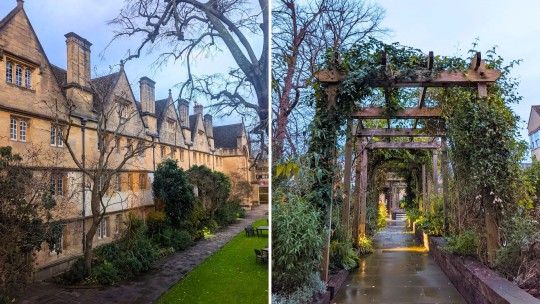
An enticing Oxford college garden in winter 🌿. In the seventeenth-century, the gardens of Wadham College were filled with such wonders as a talking statue and a rainbow-maker 🌈.
#oxford#academia#college life#cottagecore academia#classic academia#college#mine#university of oxford#winter#old architecture#academia aesthetic#academia moodboard#moodboard#study#university#school#cottagecore#whimsical#magical#english garden
95 notes
·
View notes
Photo
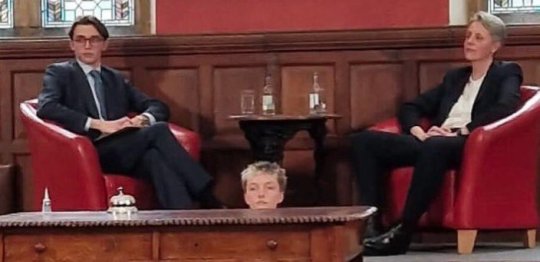
Quid ergo dicemus, cum et silentii et orationis magna utilitas sit? *
- Sallust
What then should we say, considering that there is great utility in both silence and in speaking? *
Prof Kathleen Stock, a university professor of philosophy was hounded out of her post by trans activists for her gender critical views. In her work she tackled the relation between sex and gender identity, arguing among other things that: womanhood and manhood reflect biological sex, not gender or gender identity; the claim “transwomen are women” is a fiction, not literally true; sexual orientation (being gay, being lesbian) is determined by same-sex attraction, not attraction to gender identity; spaces where women undress and sleep should remain genuinely single-sex, in order to protect them; and children with gender identity disorders should not be given puberty blockers as minors. For holding such views she was subject to torrential abuse and subsequently hounded out of her academic position by a vocal minority of student trans right activists for holding such ‘transphobic’ views.
Stock was invited first by the Cambridge Union and later the Oxford Union to debate her views. At Oxford, trans activists tried to get her invitation rescinded on the basis that her views constituted ‘hate speech’. The Oxford Union was threatened by the Student Union to deny her a platform. To their credit, the Oxford Union held fast to their free speech principles while a petition signed by many Oxford academics, including Richard Dawkins and Nigel Biggar, came out in support for Prof. Stock.
Trans activists did their best to disrupt the event outside with a march while also offering ‘safe spaces’ for triggered Oxford students in a nearby college room complete with energy bars, ear plugs, and bottled water.
Inside the chamber, one activist, Riz Possnett, glued her hand to the chamber floor, in an attempt to disrupt Stock’s talk, until she was removed by police. The privately educated Possnett (£41,000 year private school in Hong Kong) reading PPE at Wadham College, Oxford, is no stranger to controversy as��‘they’ was known to be an Extension Rebellion activist and Republican agitator, having previously broken into Windsor Castle to frolic on King Charles’ bed with ‘their’ partner.
Prof Stock told the Union that some universities were “becoming propaganda machines for a particular point of view”. She said she did not find it “traumatic” to have protesters outside the event and said that students in her generation staged similar protests. “Generally what I find more worrying is when institutions listen to protesters and take that voice through into the institution and basically become propaganda machines for a particular point of view and then everyone else in that institution feels that they can’t say what they want to say,” she said. She said that had happened in some universities. She told the Union said it would “take courage” for people to realise that “the world does not end” when you have disagreements.
Photo: Prof Stock brought the severed head of a trans activist to display in an attempt to trigger her critics. Is there no end to this woman's evil?
#sallust#latin#classical#quote#kathleen stock#stock#free speech#woke#anti-woke#trans activists#oxford union#oxford#university#debate#gender critical#biological sex#gender wars#culture war#culture#society#britain
40 notes
·
View notes
Text
Oxbridge Avalanche
I was going to write this intro about CJ doing the Jackal, a famous scene from the West Wing.
But I have seen a load of tweets about the fact that Oxford and Cambridge are allowed to enter multiple colleges on Uni Challenge, so I've changed my mind.

Multi College Entries
To replace The Jackal, I am going to recycle a post I wrote on the subject in 2016.
I am doing this because:
We are in the midst of a climate crisis and any kind of reuse helps out. Think of the energy it would take to generate an entirely new post.
It slaps, and says pretty much everything I would say now, but if anyone complains about it I can say that they were the words of a snot-nosed 20 year old who didn't know what they were doing. Giving me some sort of diplomatic immunity.
Anyway, this originally formed part of the intro for a post about the first round match between Wadham, Oxford and Robinson, Cambridge in 2016.
Let me know in the comments if you disagree (or agree) with any of it.
Sign up for The University Challenge Review
Intro to Wadham vs Robinson
August 2016
I consider myself to have a reasonable grasp of how to use Google in the mission of finding answers to tricky questions, but I have thus far failed to find a satisfactory reason as to why Oxford and Cambridge Universities were ever allowed to enter multiple teams in the first place. Durham also has a collegiate system, for example, but they get just the one team, which flatly debunks the only logical point ever put forward. The reason generally given is that each of the colleges are distinct entities, because tutorials for each college are held separately from the rest.
But that, frankly, is a nonsense non-explanation. Lectures for each course are attended by students from all of the colleges. This is the same as for all Universities and all courses at all other Universities are then split down into tutorial groups too. The only difference is that outside Oxbridge you don’t live with your tutorial groups or under any kind of collegiate label. Another reason given, I think entirely seriously, was that each college has its own individual library…
The Manchester team of 1975 famously protested the bias by answering every question with either ‘Trotsky’, ‘Lenin’ or ‘Marx’, which, while in its own precious way was quite noble, surely must have been a most dreary half hour of viewing. This achieved nothing, as evidenced by the eleven Oxbridge entities competing in this years series. Perhaps a better protest would have been to, like their recent counterparts, win the series. I think the main reason that this is still the situation nowadays is the classic ‘its-always-been-this-way-so-why-would-you-change-it’ argument, rather than anything that actually makes logical sense.

So why, in this enlightened era when even the most corrupt of organisations in FIFA have been persuaded to initiate goal line technology has nothing been done to change this?
The explanation most commonly given is that were the two Universities to field a singular team they would both produce invincible monsters, and sweep aside all comers in what would surely become the most boringly predictable of spectacles. Splitting them into colleges makes the competition fairer to the other, less prestigious institutions, who would undoubtedly stand no chance against either Oxbridge ‘Superteam’.
This argument though, falls short on all counts. Oxbridge Universities may have won 54.5% of the 22 series since Jeremy Paxman became presenter, but when you consider that they have comprised 39.3% of all competitors that statistic doesn’t seem so impressive. If you let Novak Djokovic enter both himself and forty nine clones into Grand Slams (39.3% of 128) then he would have won more than the twelve he already has, and that would then have prevented less high-profile players (or Universities) from taking part. Manchester University, meanwhile, have won 18.2% of these series with only 2.5% of the entrants, though that comparison is probably a tad facetious.

As stated at the start of this post, this series features three Oxbridge matches in the first round alone, which guarantees them three teams in the second round (including one Cambridge team specifically, given the Cam-Cam match in week four) and eight chances in total for a team to make that stage. All other entrants only have one chance, so part of their success has to be attributed to the advantage they both already have before a question has even been asked.
2024 Retrospective
Reading this back, I can quickly pick holes in the Djokovic analogy. If it were to be a fair comparison then the 49 Djokovices (Djokovici?) would need to be lesser than the one true Djokovic, making it unikely they would outperform the expected number of grand slams.
But in general, I think it mostly stands up. There aren't really any good reasons as to why there are multiple Oxbridge teams other than 'that's the way its always been done'.

And the 'Superteam' argument can be more readily disputed nowadays, given that non-Oxbridge universities have won each of the last six series, with no Oxbridge teams making the final in the past three years.
Other unis have developed stronger quiz scenes, taking away some of the Oxbridge advantage.
Maybe they are in need of a superteam in order to compete with the new wave of quizzing behemoths.
Pre-Match Analysis
Anyway - let's get on with this episode, which was between Exeter and Christ's.
Exeter made the quarter-finals in 1997, but haven't been on since 2009, which is the only year in which both Exeter and Exeter, Oxford appeared on the show.

Here's your first starter for ten.
Christ's, Bethlehem gets us off to a good start with Clara Schumann. I had my most viral tweet of all time yesterday, pointing out how fantastic a combination of college and contestant this is.
Christ's, Bethlehem.
I wonder if he chose the college because of the potential for amusing situations like this.
When I was at uni, I picked my halls based on the fact I shared a name with one of them, and that brought plenty of mild hilarity, so I can only imagine the sheer ecstatic joy brought on by anyone at Cambridge discovering that Bethlehem goes to Christ's.
Folks, we may just have the best ever contestant/team name combination tonight #UniversityChallenge Christ's, Bethlehem CHRIST'S, BETHLEHEM pic.twitter.com/R4ISoTSYRG— Starter for 10 (@TheUCReview) October 14, 2024
Doing numbers
They take a hat-trick on pairs of kings (three (times two) wise men), with Bethlehem displaying some impeccable recall.
Do Not Despard
His captain Despard, who looks like he's time travelled from the 80s, takes the next starter with cilia, but they struggle with a bonus set on German cinema.
Another for Despard puts Christ's 55-points clear, before Gray takes a picture starter to get Exeter off the mark. They are denied a bonus because they use a verb in the present tense rather than the perfect, which seems needlessly persnickety. I get that the meaning is subtly different, but come on.
Bethlehem loses 5-points with an incorrect buzz, but makes up for it immediately with Doctor of the Church on the following starter.
Vemuri hits back for Exeter with interpreter, but they can't build any momentum and Despard takes another with the Pritzker prize. A fourth for the Christ's captain puts them 60-points to the good, before Gray - the multimedia star of the episode - takes the music starter to keep Exeter in it.
O Little Town
The Klein bottle gives him a third starter, but Bethlehem once again stops Exeter in their tracks with Croatia.
The fantastically named (indeed, in an episode which didn't feature Christ's, Bethlehem he may have got more screentime in this blog) Schuyler Colfax brings Exeter to within 20-points, but the last five or so minutes of this game belong to Bethlehem, and he notches up another four starters to end the game with seven.
Exeter 110 - 205 Christ's
Christ's join Wadham and Oriel, Oxford and Darwin, Cambridge in the second round. They can be joined at most by one more Oxbridge college - St Edmund Hall, Oxford, who face SOAS in the final first round match up.
Could this be the year the Oxbridge drought is ended?
Join me next week as St Andrews take on Cardiff.
In the meantime I'll be thinking of Bethlehem references for Christ's second round appearance.
2 notes
·
View notes
Text

Bristol UK - The Red Lodge
The Red Lodge Museum is a historic house museum in Bristol, England. The original building was Tudor/Elizabethan, and construction began in 1579–1580, possibly to the design of Sebastiano Serlio. The main additional building phases are from the 1730s and the early 19th century.
The Red Lodge is a free museum but runs on donations, and is managed as a branch of Bristol City Council.
The artworks on display at the Red Lodge are listed on the Art UK website
The Red Lodge was originally built at the top of the gardens of "ye Great House of St. Augustine's Back". The Great House was built in 1568 on the site of an old Carmelite Priory, later still the site of Bristol Beacon (formerly named Colston Hall), by Sir John Young/Yonge, the descendant of a merchant family and courtier to Henry VIII and Elizabeth I.
The Red Lodge would have originally been used as an additional guest house and entertainment pavilion, so that the Young family could promenade their guests through their eight ornamental gardens and orchards to wine and dine them.
Sir John Young died in 1589, and the Red Lodge was completed in 1590 by his widow Dame Joan. From an ancient Somerset and Devon family, Dame Joan was a sister and co-heiress of Nicholas Wadham, co-founder with his wife Dorothy Wadham of Wadham College, Oxford. She was married firstly to Sir Giles Strangways (1528-1562) of Melbury Sampford and then to John Young, who was knighted by Queen Elizabeth I when she stayed with the Youngs at The Great House on her visit to Bristol in 1574, and the arms of Young impaling Wadham are carved above the porch entrance to the Great Oak Room at the Red Lodge. A fine monument to Joan Wadham (1533–1603) with her recumbent effigy lies at the west entrance to nearby Bristol Cathedral.
Their son, Robert Young inherited the entire estate. Robert quickly spent his inheritance and had to convey the Red Lodge to his half-brother Nicholas Strangways to avoid seizure. By 1595, the building was rented out to various tenants as a residence separate from the Great House. Robert Young eventually sold the Great House to Sir Hugh Smyth of Ashton Court. It is now a museum in the care of Bristol City Council...
5 notes
·
View notes
Text

Looking out a window at Wadham College, Oxford.
Follow @obsidian-daydreams
21 notes
·
View notes
Text
youtube
An episode of Churchill's People about the Earl of Rochester being tasked to retrieve a corpse from plague-ridden London for the Royal Society to dissect.
Featuring a meeting at Wadham College with Charles II, Boyle, Hooke, Wren, Petty, Evelyn, and Wallis.
Boyle looks very Boyle (cute and awkward)

Wren only has one line and just sits there looking pretty

Evelyn looks okay. Honestly I would've cast him as Hooke instead 'cause I dig the hair.

And Hooke is, well...

2 notes
·
View notes
Text
Happy Birthday 🎂 🥳 🎉 🎈 🎁 🎊 To You
The Beautiful & Captivating English Actress 🇬🇧 🌹 Of Stage Theater 🎥 & Entertainment In Cinema 🎥
Born On January 27th, 1979
Pike was born in 1979 in Hammersmith, London, the only child of opera singers Julian Pike and Caroline Friend.
She attended Badminton School in Bristol, and while appearing as Juliet in a production of Romeo and Juliet at the National Youth Theatre, she was noticed by an agent who helped her embark upon a professional career.
After being turned down by every stage school to which she applied, she gained a place to read English literature at Wadham College, Oxford. She graduated with an Upper Second-class honours degree in 2001, having taken a year off to pursue her acting career, gaining stage experience in David Hare's Skylight, Arthur Miller's All My Sons, and several plays by William Shakespeare.
She is an English actress. Pike studied at Wadham College, Oxford and began her acting career by appearing in stage productions including Romeo and Juliet at the National Youth Theatre. She had her breakthrough for her film debut as Bond girl Miranda Frost in Die Another Day (2002), and had supporting roles in the period dramas The Libertine (2004), Pride & Prejudice (2005), An Education (2009) and Made in Dagenham (2010). In the next decade, Pike had mainstream film appearances in Johnny English Reborn (2011), Wrath of the Titans (2012), Jack Reacher (2012) and The World's End (2013). Her starring role in the psychological thriller Gone Girl (2014) earned her nominations for the BAFTA, Golden Globe and Academy Award for Best Actress. Pike then portrayed Ruth Williams Khama in the biopic A United Kingdom (2016) and Marie Colvin in the war film A Private War (2018).
Pike won a Primetime Emmy Award for her role in the comedy miniseries State of the Union (2019) and a Golden Globe for her leading performance in the black comedy film I Care a Lot (2020). In 2021, she began starring as Moiraine Damodred in the Amazon Prime Video fantasy series The Wheel of Time. She received further BAFTA and Golden Globe nominations for her supporting role in the black comedy film Saltburn (2023).
Please Wish This Iconic English Actress Of Amazing & Brilliant Acting In Cinema 🎥 A Very Happy Birthday 🎂 🥳 🎉 🎈 🎁 🎊
The 1 & The Only
MS. ROSAMUND PIKE 🌹🇬🇧
HAPPY 45TH BIRTHDAY 🎂 🥳 🎉 🎈 🎁 🎊 TO YOU MS. PIKE & HERE'S TO MANY MORE YEARS TO COME
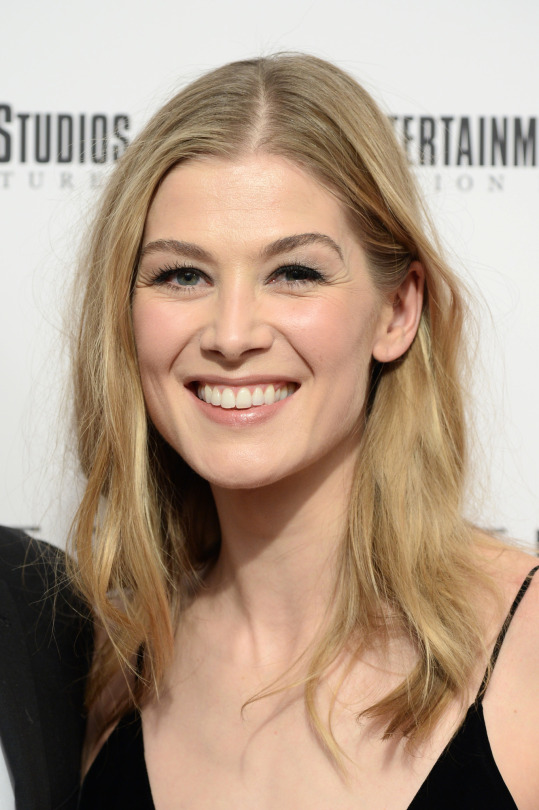


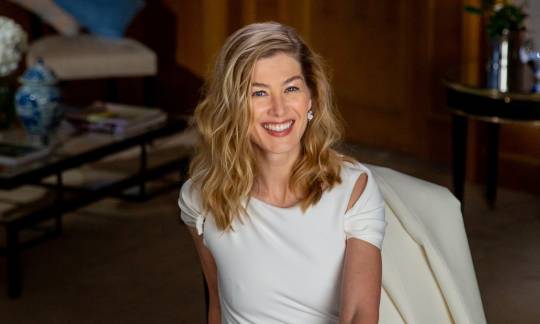
#RosamundPike
4 notes
·
View notes
Text

Dr. Kenneth C. Ulmer (December 6, 1947) was the President of The King’s University where he serves as a founding board member, adjunct professor, and Dean of The King’s at Oxford. He has served as senior pastor-teacher of Faithful Central Bible Church for over 37 years.
He received his BA in Broadcasting & Music from the University of Illinois. He founded Macedonia Bible Church in San Pedro. He studied at Pepperdine University, Hebrew Union College, University of Judaism and Christ Church, and Wadham College at Oxford University. He received a Ph.D. from Grace Graduate School of Theology, was awarded an Honorary Doctor of Divinity from Southern California School of Ministry, and received his Doctor of Ministry from United Theological Seminary. He participated in the study of Ecumenical Liturgy and Worship at Magdalene College at Oxford University, has served as an instructor in Pastoral Ministry and Homiletic at Grace Theological Seminary, an adjunct professor at Biola University, and as adjunct professor at Pepperdine University. He served as a mentor in the Doctor of Ministry degree program at United Theological Seminary.
He was consecrated Bishop of Christian Education of the Full Gospel Baptist Church Fellowship, where he served as a founding member of the Bishops Council. He has served on the Board of Directors of The Gospel Music Workshop of America, the Pastor’s Advisory Council to the mayor of the City of Inglewood, and the Board of Trustees of Southern California School of Ministry.
He is the Presiding Bishop of Macedonia International Bible Fellowship based in Johannesburg.
He has written several books.
“A New Thing”
“Spiritually Fit to Run the Race”
“In His Image: An Intimate Reflection of God”
“Making your Money Count: Why We Have it – How To Manage It”
“The Champion in You: Step into God’s Purpose for Your Life”
“The Power of Money”
“Knowing God’s Voice”
“Passionate God”
He and his wife have been married for 38 years and have two daughters, one son, and five grandchildren. #africanhistory365 #africanexcellence #alphaphialpha
0 notes
Text
Felicity Jones hollywood actress HD wallpapers

Felicity Jones is a charming and talented actress renowned for her roles in Hollywood. Her recent film, Rogue One: A Star Wars Story, has captivated audiences and topped the charts. If you're a fan eager to see more of this Hollywood star, we're excited to share a collection of the latest HD wallpapers featuring Felicity Jones.
Felicity Jones Wallpapers: Download Now
Born on October 17, 1983, in Birmingham, United Kingdom, Felicity Rose Hadley Jones began her acting career in 1996 with the TV movie The Treasure Seekers. She completed her studies in English at the University of Oxford, graduating with honors in 2006. Her early roles included appearances in college theater productions, and she has since become a celebrated figure in the industry.
Jones made a significant impression in 2011 with her performance in the romantic drama Like Crazy, alongside Anton Yelchin. Her career continued to flourish with roles in The Amazing Spider-Man 2 (2014) and The Theory of Everything, where she portrayed Jane Wilde Hawking. Her role in The Theory of Everything earned her critical acclaim and several award nominations, including Golden Globe and BAFTA nods.
After attending Kings Norton Girls School and King Edward VI Handsworth School, Jones took a brief hiatus before studying English at Wadham College, Oxford. Her acting journey included notable performances in student productions and theater, such as Shakespeare's The Comedy of Errors and Attis. She also appeared in films like Souled Boy and Julie Taymor's The Tempest.
Jones received the Special Jury Prize at the Sundance Film Festival for her role in Like Crazy and starred in The Amazing Spider-Man 2 with Andrew Garfield and Emma Stone. In The Theory of Everything, she played the role of Jane Wilde, the first wife of renowned astrophysicist Stephen Hawking.
For a closer look at Felicity Jones, her profile and HD wallpapers are available here. Enjoy browsing through stunning images of this Hollywood actress.
Felicity Jones Profile:
Birthday: October 17, 1983
Birth City: Birmingham, England, UK
Education: Norton Girls' School
Alma Mater: Wadham College, Oxford
Height: 5’3″ (1.60 meters)
0 notes
Text
The Three Marias: This was no country for young women
Cinema expandido
Foi um privilégio estar na Universidade de Oxford ao lado de mulheres incríveis para apresentar a palestra/ performance com cinema expandido “The Three Marias: This was no country for young women” no congresso internacional 25 April 1974: Unfinished Revolutions in Portuguese Literary and Visual Cultures.
Um espaço de liberdade que me foi concedido para activar esta performance no WADHAM COLLEGE/ UNIVERSITY OF OXFORD.


0 notes
Text
Michael Schmidt on 50+ years publishing poetry
Here’s how the Carcanet Press website describes him: Michael Schmidt FRSL, poet, scholar, critic and translator, was born in Mexico in 1947; he studied at Harvard and at Wadham College, Oxford, before settling in England. Among his many publications are several collections of poems and a novel, The Colonist (1981), about a boy’s childhood in Mexico. He is general editor of PN Review and founder as well as managing director of Carcanet Press."
Michael has been applying his judgement publishing poetry and fiction for more than fifty years “discovering” and rediscovering, along the way, many of the greatest writers of our age.
We met at the Carcanet offices in Manchester to talk about, among others things, what he does; Germans in Mexico; the love of poetry; The Harvard Advocate; magazines as good tools for book editors; the importance of the past; the difference between editing books and magazines; poets John Ashbery and Edgell Rickword; writers starting on the left; generous patrons: Baron Robert Gavron; prosody; syllabics; leaving room for the reader; overproduction being a straight path to bankruptcy; an education at Oxford; Milton; the Understanding Poetry anthology; writing letters; the centrality of politics; notions of balance and continuity; principles of permanence and change; the difference between taste and judgement; catalysts; the Yiddish saying: “One word is not enough, two is too many.” Changing literary culture; Wallace Stevens; enhancing, extending and revitalizing the language…all this in tandem with a chorus of Manchester trams piping in, in the background, throughout the conversation.
Check out this episode!
1 note
·
View note
Text
Yes, I can't speak for Cambridge, but Oxford's cloisters really are lovely. The colleges do also have the usual seas of brushed grass, but the cloisters are usually much older, and you can see that they are more akin to walled gardens than lawns.
New College:

Christ Church:

Corpus Christi:

Wadham:

Oxford also has expansive public parks which do feature frisbees and picnics, and Christ Church even has a sprawling meadow:


In 2020, for the first time since being laid in 1772, a section of a King’s College lawn the size of just half a football pitch was not mown. Instead, it was transformed into a colourful wildflower meadow filled with poppies, cornflowers and oxeye daisies.
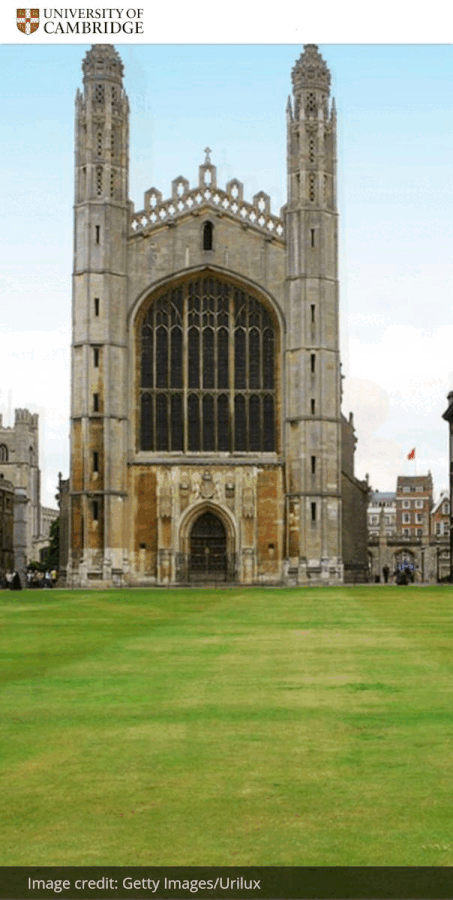
[Researcher Dr Cicely Marshall] found that as well as being a glorious sight, the meadow had boosted biodiversity and was more resilient than lawn to our changing climate. The results are published today in the journal Ecological Solutions and Evidence. Despite its size, the wildflower meadow supported three times more species of plants, spiders and bugs than the remaining lawn - including 14 species with conservation designations, compared with six in the lawn.
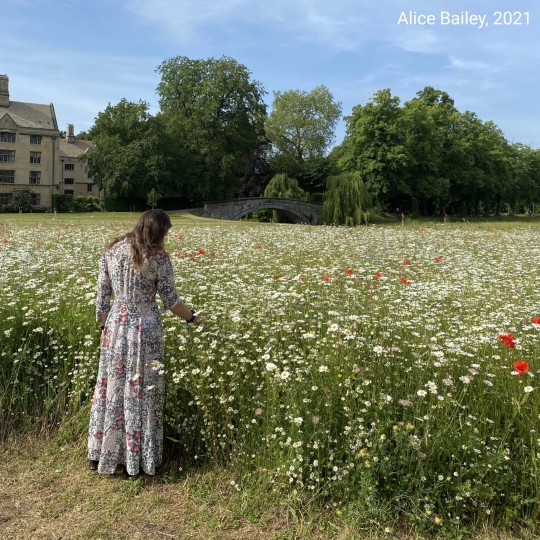
The meadow was found to have another climate benefit: it reflected 25% more sunlight than the lawn, helping to counteract what’s known as the ‘urban heat island’ effect. Cities tend to heat up more than rural areas, so reflecting more sunlight can have a cooling effect - useful in our increasingly hot summers. “Cambridge has become more prone to drought, and last summer most of the College’s fine lawns died. It’s really expensive to maintain these lawns, which have to be re-sown if they die off. But the meadow just looked after itself,” says Marshall.
#I still do hate uninterrupted grass a bit bc I do really poorly trudging through direct sunlight for extended periods#and it's such a water sink#oxford
11K notes
·
View notes
Text







Celebrating 50 years of Human Sciences at Oxford 🥂🧬
#oxford#oxford university#university#wadham college#college#human sciences#science#reunion#dinner#friends#reunited#good times#drinks#england#uk
2 notes
·
View notes
Photo

Wadham college under snow, from the college’s FB page.
I miss Oxford.
[image description: A corner of the seventeenth-century portion of Wadham College, on the south side of the chapel, which is on the right. The walls are tan sandstone, and there are several gothic-arched windows. A small tree is in the corner. Its branches are covered with snow. The college’s roof and ledges are also snowcovered, as is the ground. The sky is grey. end/description]
23 notes
·
View notes
Text
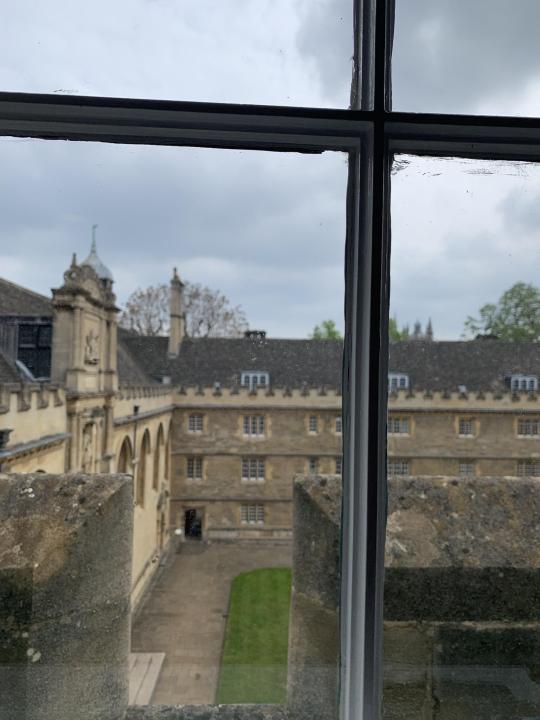
Looking out a window at Wadham College, Oxford.
Follow @obsidian-daydreams
0 notes